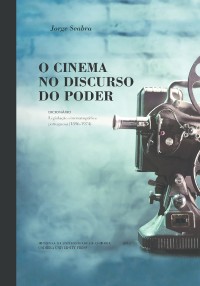Please use this identifier to cite or link to this item:
https://hdl.handle.net/10316.2/40789| DC Field | Value | Language |
|---|---|---|
| dc.contributor.author | Seabra, Jorge | por |
| dc.date.accessioned | 2016-12-23T14:34:24Z | |
| dc.date.accessioned | 2020-03-15T20:38:48Z | - |
| dc.date.available | 2016-12-23T14:34:24Z | |
| dc.date.available | 2020-03-15T20:38:48Z | - |
| dc.date.issued | 2016 | - |
| dc.identifier.isbn | 978-989-26-1194-5 | por |
| dc.identifier.isbn | 978-989-26-1195-2 (PDF) | por |
| dc.identifier.uri | https://hdl.handle.net/10316.2/40789 | por |
| dc.description.abstract | Portuguese cinema in the speech of political power is a dictionary about portuguese cinematografic legislation (1896-1974), since the existence of moving images in Portugal (1896), till 1974, passing through three political regims, wich are the end of Constitutional Monarchy (1896-1910), the First Republic (1910-1926), and The New State (1933-1974). The dictionary contains 123 entries, which are based on six global subjects: (1) The political power and inspective organs (11 entries); (2) The cinema between education and propaganda (12 entries); (3) Criteria, process and organs of censorship (14 entries); (4) The industry, the economic agents and the State (38 entries); (5) The cinematographic show (31 entries); (6) The professional and the sector organs (17 entries). Portuguese cinema in the speech of political power is the first sistematic research about the way as political powers rule the cinematographic activity in Portugal, through a sistematic and continuous source as legislation is, that is understood as a speech through which political power expresses his normative will. | eng |
| dc.description.abstract | O cinema no discurso do poder é um dicionário que efetua o levantamento da legislação dirigida à instituição cinematográfica desde a existência do cinema em Portugal (1896) até 1974, percorrendo três regimes, o fim da Monarquia Constitucional (1896-1910), a Primeira República (1910-1926) e o Estado Novo (1933-1974). O dicionário é constituído por um total de 123 entradas, que têm na sua basea análise de seis temas globais, concretamente (1) O Poder e órgãos inspetivos (11 entradas); (2) O cinema entre a educação e a propaganda (12 entradas); (3) Critérios, processo e organismos da censura (14 entradas); (4) A indústria, os agentes económicos e o Estado (38 entradas); (5) O espetáculo cinematográfico (31 entradas); (6) Os profissionais e os organismos do setor (17 entradas). O cinema no discurso do poder é o primeiro estudo sistemático sobre a forma como os poderes políticos enquadraram a atividade cinematográfica em Portugal, a partir de uma fonte sistemática e contínua como é o caso da legislação, que por isso mesmo é entendida como discurso que expressa a vontade normativa dos poderes instituídos. | por |
| dc.language.iso | por | por |
| dc.publisher | Imprensa da Universidade de Coimbra | por |
| dc.rights | open access | por |
| dc.subject | Portuguese Cinema | eng |
| dc.subject | Portuguese Cinema and Legislation | eng |
| dc.subject | Cinema Português | por |
| dc.subject | Cinema Português e Legislação | por |
| dc.title | O cinema no discurso do poder: dicionário sobre legislação cinematográfica portuguesa (1896-1974) | por |
| dc.title.alternative | Portuguese cinema in the speech of political power: dictionary about portuguese cinematographic legislation (1896-1974) | eng |
| dc.type | book | por |
| uc.publication.location | Coimbra | por |
| dc.identifier.doi | 10.14195/978-989-26-1195-2 | por |
| uc.publication.digCollection | PB | por |
| uc.publication.area | Ciências Sociais | por |
| uc.publication.manifest | https://dl.uc.pt/json/iiif/10316.2/40789/149632/manifest?manifest=/json/iiif/10316.2/40789/149632/manifest | - |
| uc.publication.thumbnail | https://dl.uc.pt/retrieve/8244322 | - |
| uc.itemId | 54659 | - |
| item.grantfulltext | open | - |
| item.fulltext | With Fulltext | - |
| Appears in Collections: | Pombalina | |
Files in This Item:
| File | Description | Size | Format | |
|---|---|---|---|---|
| o_cinema_no_discurso_do_poder.pdf | 8.03 MB | Adobe PDF |  |
Items in DSpace are protected by copyright, with all rights reserved, unless otherwise indicated.
